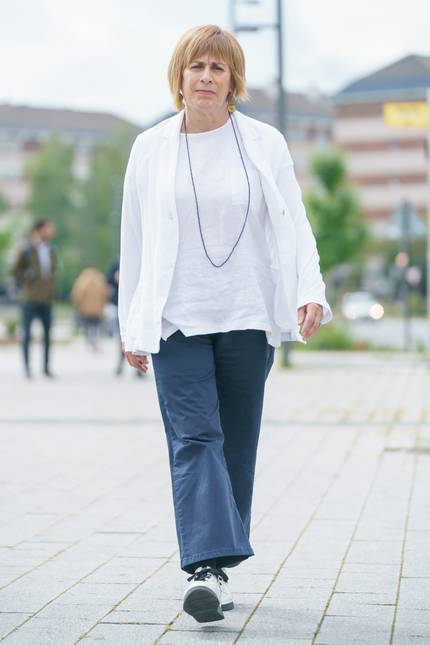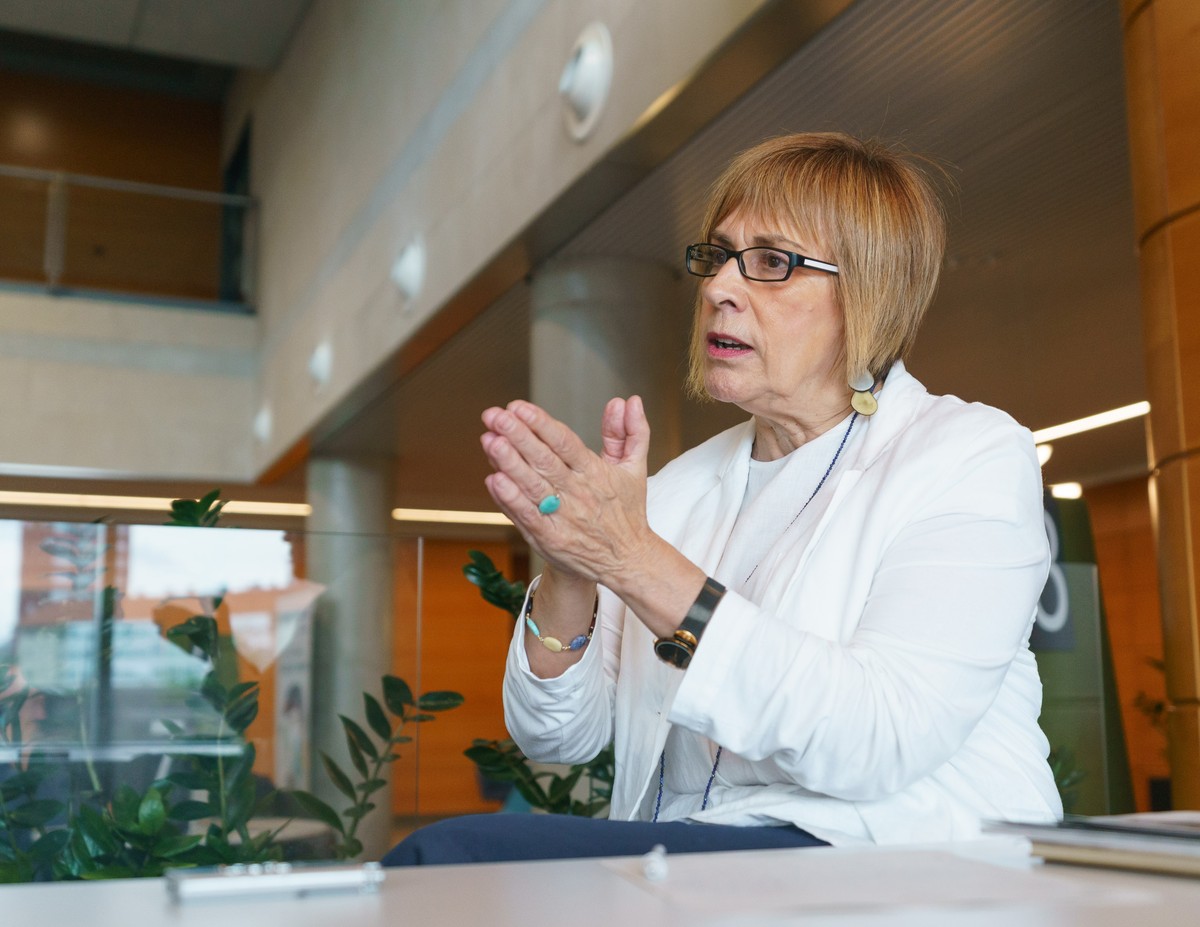“There is a hierarchy that must be abolished.”
We were welcomed as close and as lively as ever at the entrance to the headquarters of the Basque Government. In fact, she works there in the Public Health and Addiction Department of the Department of Health. Twenty years ago, in the IBERICA study on myocardial infarction, she realized the influence of sex and gender in this pathology. Since then, it has focused its efforts on the study of the influence of social determinants in health studies, especially of the sex and gender variables. Even in his current position, in renewing his health and addiction plans, he has worked with this approach and also answered questions in the interview, with the security provided by his long career and the dedication required by the complexity of the subject.

Nine years ago, with your participation, we published a series of articles in the magazine Elhuyar on the discrimination suffered by women in medicine. Do you think the topic is still current or has it already been overcome?
No, no, it’s still current, because it’s very difficult to change roles and stereotypes, and I experience resistance to change almost every day in my work. Of course, losing the privileges of patriarchy is not an easy matter. In addition, we cannot think that the steps taken are taken forever; on the contrary, in these times, various aspects gained are in danger.
I think it’s a hierarchical issue. When a certain group, no matter whether it is for class or gender, is placed above another, the inferior suffers.
it has been 20 years since the publication of the IBERICA study. It was a milestone in your career, wasn't it?
Yes, without a doubt, it was a milestone. It was the moment when my mind clicked and I was able to understand the reality around me and, above all, to explain many things.
The importance of this study lies in the fact that in epidemiology, when we carried out studies in the population, and when we wanted to know, for example, why there were more risk factors in one group than in another, we always divided them according to sex and age; but this click was to ask why women died more than men due to infarctions. I mean, the point is to ask questions. We saw that women had a higher risk of death.
Another element that makes this research a milestone for me is my mentor at the time, Rosa Rico. In fact, I had pretty clear concepts about gender, and I didn’t have that much at the time. So it was thanks to him that we talked, and I focused more on the scientific side, and he looked more at the other side. So we changed the design of the study: so that more women could participate, to know what biases were made in the conceptualization of the population, what biases were made with information, what aspects were according to sex and what gender... For this, the research was fantastic, because it included all of this.
Among other things, because sex and gender both influence, in different aspects.
That's what it is. For example, the risk of heart attack is lower in women than in men until menopause. In the meantime, women seem to be protected by hormones, but then no longer. This is due to sex, but there are also biases due to gender.
We then formed a working group in the Health Department with the UPV and created a series of clinical guidelines without gender bias. But we couldn’t continue because it was a side job. We took a Canadian model that said that there is a hierarchy: first, in this case, man/woman; second, don’t see the differences—in our case, sex. That is, in health research, the first thing to analyze is whether there are biological differences between men and women: differences in anatomy, pathophysiology... We saw the differences In COVID, in liver diseases... This has already been investigated a lot and it is clear that we are different according to sex. Even in the kidney cells! It’s not just that women’s are smaller and men’s are bigger; they filter differently. That is, we are different in everything, although only “bikini medicine” has been studied in women, that is, related to reproductive organs and motherhood.
It is essential to investigate the sexes separately. That's why when they say sex should be eliminated, in health research, it doesn't make sense.
Continuing with the hierarchy, then there are double standards. That’s what we talked about about symptomatology. If you have a Hollywood infarction, there's no problem. I mean, when you're like a man. The price women pay is different. Therefore, if you do not have a Hollywood infarction, but, as is usual in women, if you have other symptoms, this is where the double standard appears. Following the stereotype, this disease has been associated with men; and in women, where the symptomatology is less pronounced, it is considered anxiety. However, if a man had an infarction with less clear symptomatology, he would immediately undergo an electrocardiogram.
Therefore, there is a hierarchy that must be abolished.
Look, I once asked the guy with the Osakidetza money accounts to send me the hospital admissions expenses. They always give a total expense, but I asked her to give it to me, divided by sex. And although in a certain age range the expenditure of women is higher, due to childbirth, the average is higher in men: they undergo more tests, they spend more time in hospital... Women are living longer.
So we're still not in a position to break the distinction between sex and gender in research, are we? This is what they said in an editorial in the journal Nature: that the distinction is simplistic and should be abandoned. Nature itself does not agree.
No, not at all; on the contrary, we are very far away. It would be utterly absurd.
It's true that he's on the streak. Recently, Rosa [Rico] and I were having lunch with a friend who said: “It would be nice to remove the sex variable from the record.” And I was like “No, please! We couldn’t investigate.” Think about it: because of the influence of androcentrism in science, research has always been done in men and then extrapolated to women. And that’s exactly why we’re here, for example, 80% of drugs that are discarded after marketing are discarded because they cause unexpected side effects in women. Or we don’t know if aspirin has a different preventive effect in men and women, such as stroke or heart attack. Or to know that the metabolism of alcohol is also different, and that we metabolize it worse, so that with the same measure of intake we have more ethyl intoxications... All this must be known, and that is why a feminist look is essential in research. And it must be taken into account that discrimination is always relational: one group, with respect to the other.
A meme I saw recently came to mind: "When studies in mice are extrapolated to humans, as the title should put in mice, when generalizing studies in men, it should put in man."
It's just that! The opposite also happens, eh? Less, but it’s significant what happens. Their newsletter at the Pharmacy Department included information on the treatment of osteoporosis. And osteoporosis is a disease socially associated with women. So what's going on? Well, the bulletin compared osteoporosis drugs and put on one of the tables “tested on men?” and it showed “no, no, no, yes, no...”. I've never seen anything like it! In the rest of the diseases, I have not seen it determined if it has been tested in women, except in pregnant or nursing women.
And it's not even investigated in trans people, so you never know. In addition, situations vary greatly from one to the other.
This is a very interesting subject and I hope that steps will be taken in the right direction. Because when they say that sex should be canceled, we believe that sex should be canceled, gender should be canceled. That is to say, that each one expresses the gender as he wants, even if he wants to appear without gender or segregates from one to the other; but in a study, biologically, it would not be correct to include a trans woman, for example, in the group of women, because it would distort the results.
That does not mean, and I want to make this clear, that they should not be investigated. In addition, some health problems are being observed in transplants that have been hormonal since a very young age. Therefore, these types of cases need to be well known in order to be dealt with properly. Those who are different cannot be treated in the same way, and those who are different cannot be treated in the same way.
It is true that at the moment it is not easy to talk about this, because there is a lot of noise, and sometimes we even shut up, afraid that it will be misunderstood. But no, the best thing is to speak clearly. For example, some say that there are more differences between women than between a woman and a man. Yes, that will happen, too. But this is not a reason not to investigate the differences between the sexes. It will be necessary to know what you are investigating, and if it can be influenced by sex, to decide whether or not you will consider the sexual variable. And if the ethnicity or any other variable is also significant in this particular matter, then it should also be analyzed separately.
You're in the Addiction Department. The effects of sex and gender will also be clearly seen there.
Clearly and unequivocally. In tobacco smokers, for example, women have been found to be less dependent on nicotine. Suppose a woman wants to quit smoking and goes to Osakidetza. If you think you’ll need treatment, you’ll be given a Fageström test to assess the extent of your tobacco addiction. And one of the questions is whether you need to light a cigarette as soon as you wake up. So many women answer no; because, as I said, they don’t have as much dependence on nicotine as men. Therefore, this test has a bias that discriminates against women, who will give the drug or not depending on the score given by the test.
In the case of alcohol, when talking about low-risk consumption, the recommendation is already separated by sex.
On the other hand, there is gender. We see a trend in girls that we also had in our time to mimic the risky behaviors of boys. And in reality, it should be the other way around: boys should make an effort to get rid of this toxic masculinity. Because it often just makes them suffer, doesn't it? Prevented from showing emotions, driven to take great risks...
I know it is difficult to assimilate the message, but I always insist, especially in the leisure spaces. Besides, the girls have more to lose. It shouldn't be like that, but, by the way, by the division of roles, it is. I’m not going to say that they shouldn’t consume so much, but that they have complete information and be aware of what they gain and what they lose.
The consumption of anxiolytics is also higher in girls than in boys. I think it's the only substance that girls consume more. Now there is a new project in Osakidetza that looks good. The goal is to influence those who prescribe it, as well as the population. Because the daily discomfort causes suffering and we seek solutions. The problem is that they are highly addictive substances that cause tolerance, which is why they are recommended for short periods. What is the matter? The causes of these discomforts should be resorted to; sometimes they are inevitable, sometimes they are not... They are deep and many of them are social in nature. Not all, huh?
Finally, women with addictions, whether substance or behavior, have a double stigma: for being addicted and for being a woman. As a result, they ask for help later, the treatment spaces are very masculinized, they have the syndrome of being bad mothers, they are afraid of losing the care of their children... In other words, the process of treating addiction is more complex than in men.
However, from what you are saying, steps have been taken to incorporate a gender perspective in health research, right?
Oh, yeah, yeah. You always find friends, and with the head of the library of the Basque Government’s Health Department, Arantza Romano, we have created a search system to filter articles analyzed by sex. And they come out a lot.
My suspicion is that there is money behind it, under the pretext of personalized medicine. For example, in order to offer an appropriate treatment for oneself, sex is essential.
I wanted to ask you what other actors besides sex should be considered in health research, and one will be that, ethnicity, right?
Ethnicity, origin (i.e., being a migrant), socio-economic status, and disability, perpetually forgotten.
Another question I want to ask you is: have you ever felt undervalued for being a woman or for doing work with a gender perspective?
Both for being a woman and for acting with a gender perspective, for both. Because I’m a woman, I feel like I have more weight now, but before, my head of service was a man, and yes, without a doubt. In the meetings it was very difficult to find a space to talk, the recognition was always for the head of the service... Now it has changed, or rather I don’t notice it; that doesn’t mean it doesn’t happen.
Even with a gender perspective, there is a female profile of those who reach high positions and believe that they have arrived on their own merits. And yes, it is, but if other women had not fought before to be there, they would not have arrived. They, however, do not see this and somehow underestimate the gender perspective. In fact, socially, it’s partly about placing yourself in the losing group when you don’t feel like a loser yourself. I think it’s very healthy to be there.
What would you like to see in the future?
[Take a moment to think] I don’t have a fantasy dream; what I would like is quite pragmatic: I would like there to be continuity. That this path continues for future generations, that there is a continuum. And for that, training is also key. It is not enough to do courses and things like that, but it is necessary to have a culture that requires knowledge to reach everywhere.
For example, there has been no progress at all in the medical academy. It's my turn to give a lecture to family medicine residents, and I realized that they haven't heard anything about this before. And some of them didn’t even want to hear it: there was a boy who had been looking sideways or upwards the whole time I spoke. And another one discussed the results of the IBERICA study. Discuss the data! If these young people, at the end of their studies, go to primary care consultations, or to emergencies, and perhaps adapt to the care of a woman who has just had a heart attack, who does not have the symptoms considered common during the heart attack, it is important that they have previously worked on a gender perspective.
Medical studies are still carried out from a biomedical perspective, based on the disease, and focused on diagnoses and treatments. And they lack the whole aspect of health and life, including gender. That is what I would like: that there is a continuum, to move forward.
Buletina
Bidali zure helbide elektronikoa eta jaso asteroko buletina zure sarrera-ontzian













